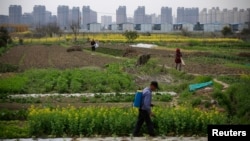China is opening up its agriculture industry to corporate farming, a move that could have wide economic and political implications. That decision may gradually phase out collective farming, which has long been one of the Communist Party’s main political levers through a national network of provincial and county leaders.
China is hoping to entice foreign and private capital to invest in the tightly-controlled agricultural sector. State media also notes the policy aims to promote and standardize the “transfer of the right to use farmland from rural residents to commercial entities.”
The plan comes after authorities announced earlier this year that they want to relocate 100 million farmers, about 12 percent of the rural population, into smaller cities. The farmland they leave behind could be bundled together into larger tracts that would be farmed by companies using more modern methods.
Game changer
Under Chinese law, farmers collectively own rural land. Individual farmers are allowed to use the land under a contract system that has been in place since the 1970s. But that system has left vast tracts of Chinese farmland unattended in recent years because of a high level of labor migration to fast-growing cities. In some cases, local collectives also have been abused by corrupt local officials who colluded with developers.
The government is looking to change this system and use businesses to improve farm productivity. China is known for its inefficient use of water and fertilizers, which is a problem that could be addressed by new technologies.
“This is going to be a game changer with wide implications both for the economy and the political system,” Erlend Ek, agriculture research manager for consulting firm, China Policy, told VOA. “New opportunities are opening up because Chinese authorities are seeking partnerships with foreign companies in the field of agriculture technology.”
But the shift could mark a stark break with the past. During the era of Communist Party chairman Mao Zedong, the party’s influence grew out of its efforts to equally distribute land rights by creating co-operatives or collectives of farmers. This strategy waned over the years as China moved toward large-scale industrialization and rapid urbanization.
State media says that there is popular support for switching to corporate farming. “There have been a growing demand from rural residents for transferring farmland to others for management and production,” the official Xinhua news agency said adding, “The new policy will lead to the formation of mechanisms that will make the transfer more standardized, while land owners' rights will be better protected.”
Chinese leaders have been discussing the need to attract business investments into agriculture for years, and have taken measures to lure in international agriculture companies in specialized zones.
But analysts say this is the first attempt to create a legal process that could affect farms across the entire country.
Jacob Kirkegaard, an economist with the Peterson Institute for International Economics said the government’s aim is to persuade Chinese companies to invest in this new sector instead of merely pouring funds into real estate or investments abroad, which has been the general trend.
“This is surely the beginning of the end of “collective farming” as a very labor intensive sector,” Kirkegaard said.
Risks Ahead
There has been resistance among pro-Maoist sections of the Communist Party to handing over parcels of land to business groups.
Ek said, “Many critics, including some senior Party members, worry about switching from their traditional rural power base."
He said the move is sensible because it can lead to the better use of the resources. “But in political economy terms, there is a risk that commercializing agriculture will see a transfer of assets out of the countryside to enrich urban elites.”
Kirkegaard said the move may “lead to accelerated de-population of rural areas, as land plots are merged and investments in mechanization by new private investors are made.” The effect of this reform may the opposite of what is intended, which is to keep people in the country-side instead of crowding the cities.
Cai Jiming, a professor of economics at Tsinghua University in Beijing said while the policy will allow private and foreign companies to rent or lease the land, they will not have ownership rights, which could discourage investments.
“And as more and more farmers move into the city and relocate, the collective will be run by a small few,” instead of letting those outside the cities and companies come in and fill that gap in ownership.
Xu Bin, a professor of economics and finance at CEIBS said the policy is in line with the direction of economic reforms, which is to gradually open certain restricted areas to the private sector, including foreign investments.





